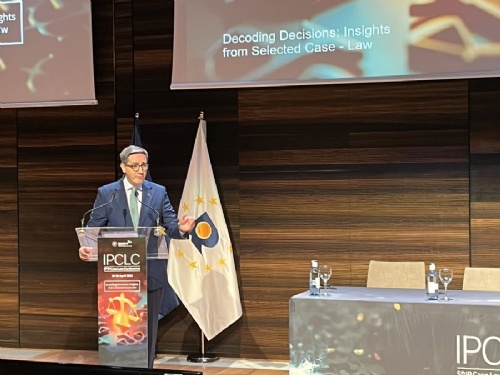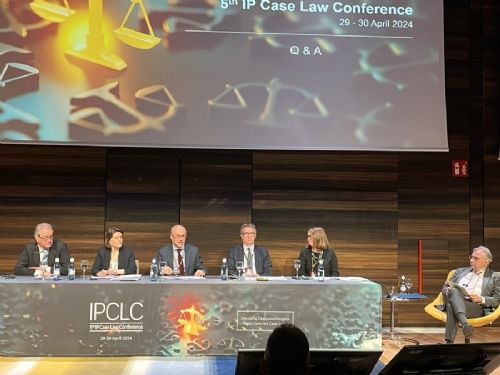Now in its twelfth year, Class 46 is dedicated to European trade mark law and practice. This weblog is written by a team of enthusiasts who want to spread the word and share their thoughts with others.
Click here subscribe for free.
Who we all are...
Fifth IP Case Law Conference – opening and panel 1
 1400 participants (including in-person and online) from 66 countries are taking part in the Fifth IP Case Law Conference organised by the EUIPO Boards of Appeal this week.
1400 participants (including in-person and online) from 66 countries are taking part in the Fifth IP Case Law Conference organised by the EUIPO Boards of Appeal this week.
The first morning of the conference saw opening speeches and a panel on recent case law featuring judges of the EU General Court and members of the Boards of Appeal.
Opening speeches
Opening the conference, João Negrão – Executive Director, EUIPO (pictured) said: “For me this is a special moment as for all colleagues at the EUIPO. Not only are we celebrating our 30th anniversary, we are also looking to the future.”
As EUIPO develops its Strategic Plan 2023, he said quality, legal certainty and predictability will remain at the forefront of EUIPO’s work, but there is more to do to promote innovation in Europe, build an IP culture and reach excluded groups, he said.
In particular, he said “there is much still to be done in regard to SMEs”. In addition, young people are sceptical about the IP system, so we need to listen to them – and many students are taking part in the conference this week. Women in innovation are also excluded: only 24% of design applications have a woman as a designer, and only 13% of patent applications at the EPO have a woman as an inventor. “We need to correct this. We are losing huge potential in terms of innovation capacity in Europe,” said Mr Negrão.
He also said the “massive response” to the consultation on the Strategic Plan 2023 showed that: “The public and stakeholders think EUIPO should do more … IP is not an end in itself. It is a connector between ideas and the market … We should always do more to ensure the IP system delivers.”
In his speech, Jorma Hanski – Chairperson of the Management Board of the EUIPO and Director, Patents and Trademarks at the Finnish Patent and Registration Office, addressed AI and IP. He stressed the need to pause and ask questions such as: what is happening? Where is it taking us? Is it what we want?
“We ought to remember that we as human beings bear the ultimate responsibility for all individual decisions,” he said, and this means considering whether we can rely on AI-based models. “Ethical considerations are to my mind more important than ever before,” he added. Ethical questions need to be discussed, internalised and applied. “This may take a long time,” said Mr Hanski.
José Antonio Gil Celedonio – Chairperson of the Budget Committee of the EUIPO and IP Attaché at the Spanish Permanent Representation of the EU, said the conference will promote capacity building, help the IP legal system to be more comprehensible and promote confidence among all parties. “We understand its value to the European and national IP systems,” he said.
He highlighted the importance of EU General Court case law in delivering a more consistent and logical approach to IP law in Europe, with more to come with new IP legislation under consideration. “Conferences such as this one demonstrate Alicante’s role as a hub for IP,” he said, highlighting the role of the University of Alicante and the IP court in the city. “This hub not only benefits this region or Spain, but benefits the EU as a whole.”
Finally, Savvas S Papasavvas – Vice-President, General Court of the European Union, said that 30 years is “both very short and very long” when it comes to law. While legal principles have not changed, legislation relating to specific technologies changes very quickly. “Ideally laws should be drafted to fit any technology, including future ones … but the emergence of new technologies also raises questions relating to the applicability or application of legal rules,” he said.
He highlighted the “hot topics” on the agenda at the conference, including new technologies, geographical indications and design law reform as well as discussions about copyright harmonisation in the EU. The Court seeks to reduce inconsistencies in its case law and the fact that five members of the Court are taking part in the conference demonstrates the value the Court puts in the event.
Recent trade mark case law
 Judge Papasavvas also led the first panel, which discussed the evolving landscape of trade mark judgments at the EU General Court.
Judge Papasavvas also led the first panel, which discussed the evolving landscape of trade mark judgments at the EU General Court.
Judge Ulf Oberg of the General Court discussed weak elements in trade mark inter partes cases, drawing on his background as a competition lawyer. He compared opposing theses of equal protection from the moment of registration versus affording less protection for weaker marks.
Judge Oberg summarised the judgments in cases MASTERS COLORS (C-519/17), TRIPLE TURBO (T-210/17), BLACK LABEL (C-328/18 P), UROAKUT (T-266/17), ROSLAGSÖL (C-705/17), PRIMART (C-702/18), DEUTSCHE POST (T-25/20), NATURANOVE (T-602/19), APIHEAL (T-53/19) and VDL E-POWER (T-755/20) as well as the Grand Board decision in ULTIMATE GREENS (R 1462/2012-G).
“There are two strands within our case law,” he said, but added that an end is in sight: “A company who registers a weak element may have to live with the fact that others may be able to use the same element.”
In her speech, “Better late than never? The acceptability of late evidence in case law” Judge Gabriele Steinfatt focused on Article 95(2) EUTMR and Article 27(4) of the Delegated Regulation. She said the former gives EUIPO “a broad discretion” but this discretion is circumscribed by the latter, which provides two cumulative conditions on the submission of late evidence: it must be relevant for the outcome of the case and there must be valid reasons why it is late. The same principles apply to RCDs as to EUTMs.
Turning to procedures before the General Court, she said there are two situations where late evidence can be a problem. If it is submitted for the first time, it should be declared inadmissible unless it relates to the decision-making practice of EUIPO or to case law, or the accuracy of a matter of common knowledge Where evidence is submitted belatedly in the procedure before the Court, further evidence is normally only accepted when the party did not have access to the document before – with some exceptions.
In a talk titled “Not everyone knows what you know”, Judge Ion Gâlea discussed the case law on well known facts. PICARO/PICASSO (T-185/02) said that well-known f acts are those likely to be known by anyone or which may be learnt from generally accessible sources, and this has been developed in Mood Medial (T-664/22), KLOSTER (T-78/14) and BEAUTYBIO (T-80/23) which concerned information in standard dictionaries.
“In order to challenge a well-known fact, the applicant must do so in a detailed manner,” he said. According to case law, well-known facts include: gels are usually injected, mobile phones are small portable computers, the price of batteries is considerable and there is basic understanding of English, max is an abbreviation of maximum and French consumers do not follow American football. Not-well known facts include that the Italian offers provides lower control than the EUIPO!
“First, some facts may appear as better known than others,” said Judge Gâlea. “Secondly, the relevant public may differ.” Moreover, well-known facts are not specific to IP law and there is case law for example in the area of restrictive measures and anti-dumping cases. Quoting Advocate General Bobek, he said: “Justice is often depicted as being blind. However, at least in my recollection, that allegory is not meant to be interpreted as Justice being unable to see something that is blindingly obvious to everyone else.”
In “The hardest walk is solo: Recent case law on single letters”, Sven Stürmann – Chairperson of the Second and Third Boards of Appeal, EUIPO discussed recent Court and Grand Board developments on single letters, a topic on which the Boards have published a case law update.
He discussed figurative letters and single letters per se (“the most important and tricky issue). “Consumers are exposed to different styles of the same letter and it is the figurative elements that they recognise,” he said, adding that registration means a mark has the minimum level of distinctiveness, which may not be enough to confer protection in inter partes cases. In German, there are two different terms for these different types of distinctiveness.
The approach that protection for single letters should be weak has been confirmed by the General Court in T-610/21 (K) and T-458/21 (Q). This affects the assessment of visual similarity (see also T-193/12 concerning a stylised H). “In my personal view, the focus should be on the different stylisation and to consider single letters per se to be weak,” said Mr Stürmann.
He concluded by noting that, in the global assessment, the visual comparison generally plays a more important role. The scope of protection of single letters per se is therefore generally lower and much depends on other factors such as similarity of stylisation, the level of enhanced distinctiveness, relevant public etc.
In the final speech in this panel, Nina Korjus - Chairperson of the Fourth Board of Appeal, EUIPO discussed Article 8(5) EUTMR and delimiting reputed trade marks.
She said the case law has established four conditions, none of which refer to the goods and services. However, the establishment of a link is essential to prove injury and the stronger the earlier mark’s reputation the easier it will be to show detriment (SPA-FINDERS, T-67/04). The global assessment of a link was discussed in the INTEL case (C-252/07).
She discussed the impact on assessing a link in cases including GOOGLE CAR (T-569/21) and BIMBO BIKE (T-509/22) as well as the PUMA cases (T-62/16, T-4/22, T-184/23, T-266/23).
The conference continues today and tomorrow. Look out for more reports on Class 46 and MARQUES social media on the other panels!
Posted by: Blog Administrator @ 10.39Tags: IPCLC, EUIPO, General Court,


 Sharing on Social Media? Use the link below...
Sharing on Social Media? Use the link below...Perm-A-Link: https://www.marques.org/blogs/class46?XID=BHA5264

